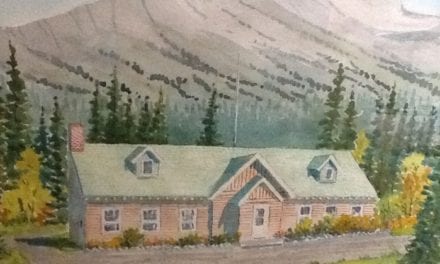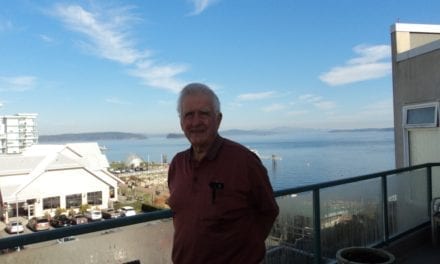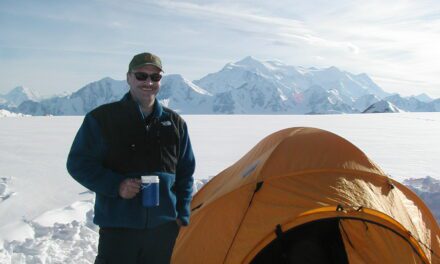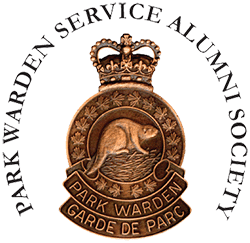Smokey – To get to Indian Head we used to ride through the Ya-Ha-Tinda Ranch. Mickey Gilmar was the ranch foreman and Ev was his wife.
Lynn – Evelyn and Mickey were most welcoming to us. They knew we were coming, summer and winter for two and a half years. Sometimes we spent the night there. Evelyn was a real mentor to me. When I realized that woman broke horses, I was very impressed! I could hardly ride one! She broke her own horse “Wings” She had two small kids when I met her and another one later, all girls. She’d haul water from the pump house, heat a huge tub of water on a wood stove for doing laundry in a wringer washer. Lifting heavy loads, cooking wonderful meals, sewing, tending to her kids…When do you have time to break a horse? Then us dragging our asses in with our junk and our dogs!
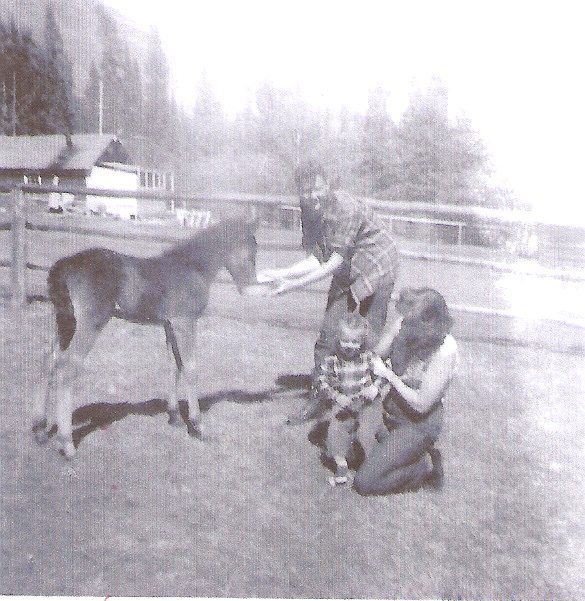
Evelyn Gilmar with her daughter Jane at the Ya-Ha-Tinda Ranch.
Mickey and Evelyn Gilmar were Smokey and Lynn’s closest neighbors.
Lynn – I seldom rode horses growing up in Banff. I just rode occasionally when Indian Days were on. The Indians would rent a horse to a white kid for 50 cents an hour. Some white kids would take their bikes down to the Indian Grounds and trade their bike for a horse. You just stayed within the Indian Grounds compound.
Smokey – There is a grave of a 12 year old Indian boy across the creek from the new house at Indian Head. In regard to someone saying there was a ghost at the new house? Not in my time.
Smokey – I put up a real beautiful gate at Indian Head carved out of wood. When they tore that down, in the footings they found the stuff that I had written there. It’s too bad that they blew up the old Indian Head cabin. It had fenced in pastures and a corral, as well as other buildings. This is where they should have built a nice big cabin.
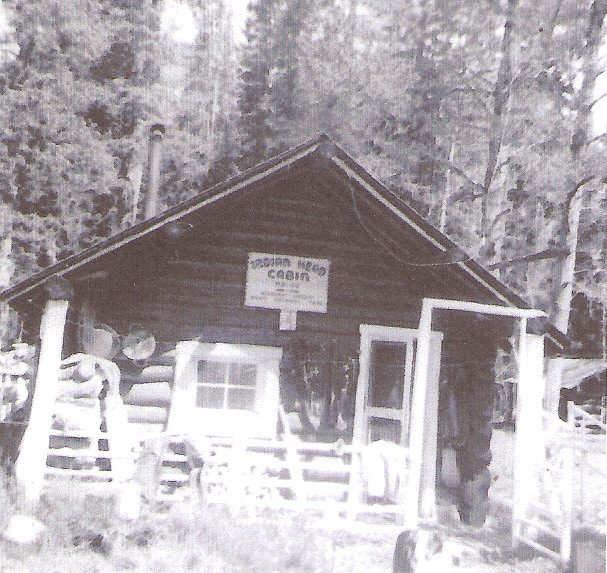
Original Indian Head Cabin
Smokey – One time I came out of Indian Head and down to the Scotch Camp cabin. Before I arrived, a bunch of Brewster cowboys were jingling the horses from that area and were going to take them down through back to Banff and Lake Louise. They said, “Why don’t you leave your horses with us?” The horses were stopped for the night at Scotch Camp. I said, “Well you can stay in the cabin here, I’ll make you a deal.” They said, “We’ll jingle your horses in the morning.” I said, “I’ll get the fire going and breakfast. You guys can stay.” “Oh no.” said the two guys. I wish I could remember his name. But there were two guys anyways. I said, “Well I think it is going to snow tonight.” “Oh, no that is okay.” In the morning it had snowed and everything was quiet. Nobody came and I thought “Jeez, they should be jingling the horses pretty soon.” I looked out underneath the tree where these guys were and you could see where one guy had an eiderdown sleeping bag with a tarp over it and everything was just nice and firm and straight. And Billy Rose, that was the guy! His was all shook loose! He was shivering under it, he was freezing to death! I said, “Hey you guys, where are my horses?” My horses had gone back to the ranch! So I lost my horses. They finally picked out a horse for me and I rode that one to Windy. Then I got a ride with Art Cartlidge back to Banff. He was a nice guy. I liked him. He was a foreman on various projects.
Smokey – We stayed overnight with Len and Maggie Stringer at Scotch Camp on another trip through Scotch Camp from Indian Head on route to Banff. The government wanted me to pay for Lynn’s supper and breakfast if you can imagine that. Our women were supposed to take in the weather and all that different stuff for the government and cook for the guys too and everything like that and they wanted me then to pay for Lynn. My travelling expenses were covered, but they made me pay for her. It was something like $2.50 for two meals. The crew was building a bridge across the Red Deer River. Len was the foreman and Maggie was the cook.
Smokey – Well you could do what you wanted pretty well. (In response to the question, “What did you like best about being a warden?”) I like working. I would fix up the district cut trails and things like that. Hard work is what I like doing. Some guys just patrolled around, but they didn’t do anything else. To me, it was important to keep the district and everything clean. At each cabin you had to have enough wood to last you a month. You knew that you were alone a lot of the time, so you had to be extremely careful. You looked after your horses. Indian Head wasn’t the easiest place to get in and out of at times because of the river. In the spring there was flooding and big trees would come down and in the fall you had the ice buildup, one layer on top of another one. Tricky crossing with horses!
Smokey – We came out of Indian Head on December 23. We had gone there in late October. We got to the river and the whole river was covered over. I didn’t know how to cross. I kept my horses too long. I tried to get the horses shoes off and the damned hammer broke on me. So I hammered the shoes and had to keep cleaning the hooves every once in a while. If the horses could knock off the built up snow on their hooves it was okay.
Smokey – I was scared of one place, Scalp Creek. It was a mile and a half of real steep trail and narrow. If your horse slipped it could go down into the gully. The gully was all treed with windfall. You couldn’t go up. So it was a hairy place. When we got to the river, I thought “How am I going to cross this thing? I better check it.” I followed an elk trail. There was a big hole in the top of the ice where the elk had gone through. I looked down in there and saw a gap, maybe a foot and a half deep and a shelf of ice below that with another hole. That is where the elk went through and I knew that I couldn’t cross there. I thought, “I wonder if there is any way to go downstream?” I tried going downstream, forget it! So I went upstream and I couldn’t do that. I had to go back to the mountain and up to the top where I found a game trail. With a saddle axe, I chopped my way through the frozen rock down to the river where it was open water all the way across. I thought, “Jesus, what luck!” Because you couldn’t see it from where the main trail was. I chopped for hours and I finally widened the trail enough to try and get the horses down. I tried to lead one horse down, but he wouldn’t come. I thought I would take Lynn’s old horse, Maude. I said to Lynn, “As soon as I get there, you get on this horse and stay there. Don’t cross the river.” I got the old horse down the steep trail. There was no place to stand. You were right in the water. Then I went back to get my other horses. I knew that I would have trouble with the two horses, so I took the old pack horse. I got his first two feet down and then there was a quick turn. I had him over balanced and he was trying to back up. I was swinging the rope in the air, swearing, cursing and hollering! Finally he came. He had no choice but to go down. We slid down and I thought, “Okay now how am I going to get the other two down?” As I was going up the trail the horses started coming down on their own. What luck! We got across the river and then there was lots of shelf ice a long way back. Oh, it was hundreds of feet and you would break through. I was scared that I would get the fetlocks cut, but as the horses stepped down it broke far enough away, so everything was fine. It was the right time of day, late afternoon. It was dark by the time we got to Parks cabin (a provincial ranger cabin) and we had to stay there overnight. Parks cabin was quite the place! There were so many holes in the cabin that you could put a four by four in some of the holes above the stove. The wind would blow the coal oil lamp out. That was one of our first trips out. The horses were tied up in an island of trees with blankets on. I had hay and oats with me. Then we had to go through the mountains in wintertime and I hadn’t been over that trail in the wintertime before. So there we were. I was able to stay high though. I knew if I got down in the bottom I would be in trouble, but as long as I stayed high, I would be okay. I finally found the trail where I could get to the Ya-Ha-Tinda.
